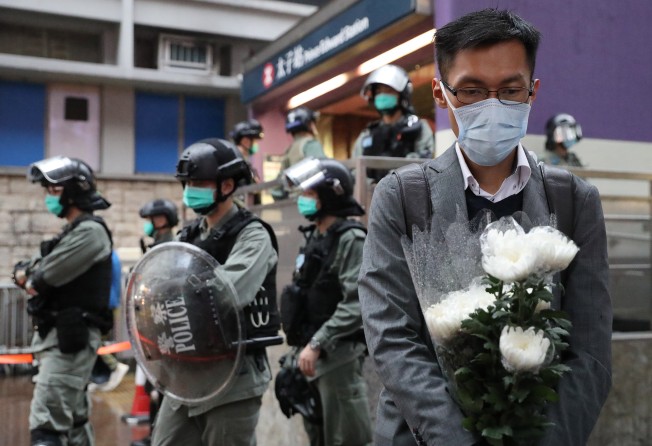Coronavirus: Hong Kong police put social-distancing rules to test at protesters’ monthly gathering
- Online messages ask people to leave floral tributes at MTR station where some members of anti-government movement believe demonstrators were killed
- But police turn up to enforce rules against groups of more than four

Hong Kong police on Tuesday night used new rules limiting public groups to stop people from gathering at Prince Edward MTR station for a monthly event held by the anti-government protest movement.
A scattered but steady stream of protesters showed up after work and passed white chrysanthemums to eight Yau Tsim Mong district councillors standing outside the station exit beside Mong Kok Police Station.
Most of them left after leaving their floral tributes, but others lingered nearby to observe what happened. They were quickly dispersed by police officers invoking the government’s new regulations to enforce social distancing amid the Covid-19 pandemic.
“The pandemic has entered a critical stage. To avoid the spread of the disease in society, please leave now,” a policewoman said through an amplifier, warning that failure to do so could result in a jail term and a fine.
Online messages had encouraged people to leave floral tributes outside the station, where rumours have led some to believe police killed protesters during a clearance operation on August 31 last year, despite repeated official denials and a lack of any evidence. Protesters have also criticised the level of force used by police that night.
The messages also noted that new measures banning groups of more than four, in an attempt to curb the spread of the deadly coronavirus, had come into effect.
“Liberate Hong Kong; revolution of our times,” crowds at the station chanted briefly, using a refrain common over the months of unrest.
A 21-year-old student, surnamed Chan, criticised the government’s regulations, saying they were a further crackdown on freedom of assembly masquerading as an anti-epidemic measure.
Another protester, a medical professional surnamed Nam who had gone to the site to leave flowers, said she appreciated the government’s original intent.
“But I think since people don’t believe this government any more, people think it is just another excuse to impose more criminal sanctions,” said the woman, in her 30s.
The practicality of the four-person cap was tested when one person walked towards a group of four. Officers grabbed one of the four for a brief body search. A separate group of young people were stopped and held inside a cordon area.
Later, police repeatedly raised a blue flag, warning people at the scene that they were part of an unlawful assembly. Several protesters were seen being held to the ground by officers, while others hurled verbal abuse at police.
A police source familiar with Tuesday’s operation said officers would first try to persuade people against forming crowds, and hoped not to make arrests on the spot.
“It could be followed by a verbal warning,” the source said. “We respect their freedom of expression. But whether they are protesting, gathering or just purely paying floral tributes, the risk of infections still exists when a group is formed. There is public hygiene to consider.”
The Post understands the force had sought legal advice from the Department of Justice and reserved extra manpower to handle possible clashes.
“The protests and any illegal acts are still constrained by the Public Order Ordinance and also the Crimes Ordinance. Officers will act accordingly,” the source said.
Last month’s gathering descended into chaos as protesters hurled petrol bombs and police fired rounds of tear gas, with an officer drawing his firearm. Some 115 people were arrested over the biggest outbreak of violence since Covid-19 emerged in Hong Kong in late January.
The anti-government protests began in June last year in response to an extradition bill that laid down the framework for transferring suspects wanted in mainland China, as well as other jurisdictions outside Hong Kong. The government was eventually forced to back down and withdraw the legislation.
The city had recorded 715 infections, most of them residents returning from overseas, as of Tuesday afternoon.
Chief Executive Carrie Lam Cheng Yuet-ngor warned of a “public emergency situation” when she announced the tough social-distancing measures last week in a bid to regain control over the spread of the disease.
The ban on groups of more than four people came into effect on Sunday and was scheduled to last at least 14 days. The rule does not apply to private settings, the workplace, public transport, weddings, funerals, courts or government buildings and meetings.
Violators could be fined up to HK$25,000 (US$3,225) and sent to prison for six months, but can opt to pay a fixed penalty of HK$2,000.